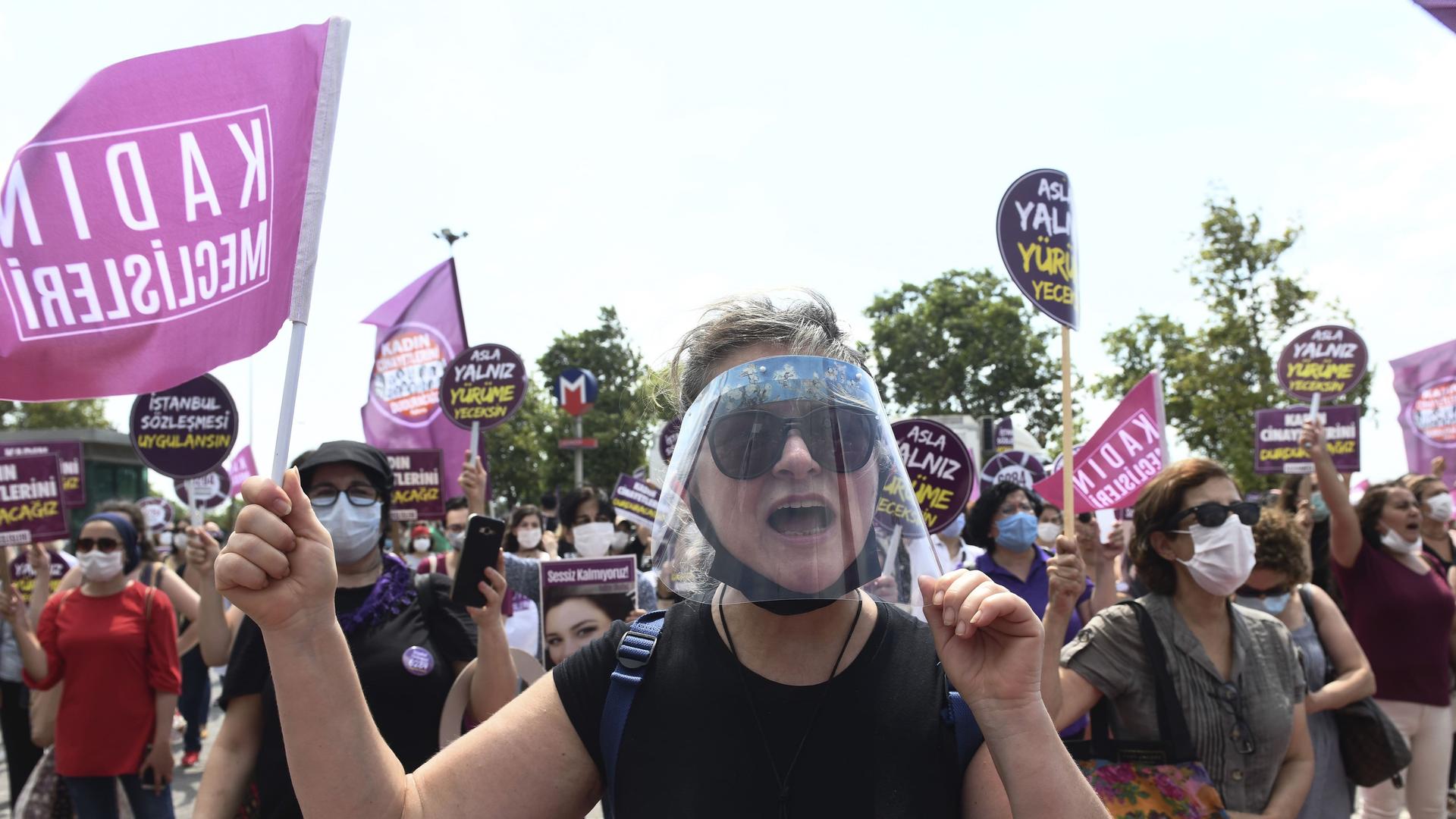In Turkey, a conservative push to remove domestic violence protections is met with an uproar
In Turkey, a push to retreat from an international agreement to prevent violence against women was met with an uproar, as women from broad swaths of Turkish society held protests across the country.
Leaders of Turkey’s ruling Justice and Development Party (AKP) were expected to announce a decision on the matter after a meeting on Aug. 5, but Turkish newspapers reported Tuesday that the gathering has been postponed indefinitely.
Related: Turkey passes ‘draconian’ social media legislation
Turkish women, however, say they will continue to protest.
“Men use violence because they see women beneath them, as inferior to them. …We see these problematic discourses, every day in the media.”
“Men use violence because they see women beneath them, as inferior to them,” said Elif Ege of Mor Cati, a private shelter foundation for victims of domestic violence. “We see these problematic discourses every day in the media.
Nearly all countries in Europe have signed on to the Istanbul Convention, a set of international standards to prevent violence against women. The treaty is based on the principle that domestic violence, rape and other forms of gender-based violence are committed against women precisely because of their gender.
But conservatives in Turkey’s government have said that they would push for a withdrawal, claiming that the treaty threatens family values and that Turkish citizens also want this change.
“When our people have such an expectation [to withdraw], we cannot stay indifferent to this. …As we have duly signed it, then it would be possible to duly withdraw from it.”
“When our people have such an expectation [to withdraw], we cannot stay indifferent to this,” said Numan Kurtulmus, the deputy chairman of Turkey’s ruling AKP, during an appearance on national TV on July 2. “As we have duly signed it, then it would be possible to duly withdraw from it.”
Related: Expulsions, pushbacks and extraditions: Turkey’s war on dissent extends to Europe
Kurtulmus claimed that the LGBTQ community has “taken refuge” behind the document’s concepts of gender equality in a country where same-sex marriage is illegal, and protections against discrimination are not clearly defined. Kurtulmus further claimed that a withdrawal from the treaty would not increase domestic violence.
These sentiments are echoed in Poland, where, in July, lawmakers also indicated the country would leave the treaty, citing its requirements to teach children about gender and its “ideological nature.”
Kurtulmus’ position has some support among those most powerful in Turkey’s government.
Earlier this year, Turkish President Recep Tayyip Erdoğan said that the way to stop violence against women is to strengthen the institution of the family.
“If there is violence in the family, what kind of family is it?” exclaimed an incredulous Melek Önder, spokesperson of the Istanbul-based We Will Stop Femicide Platform. “I think only a small group of men — conservative men — are demanding this.”
Önder’s organization counts murders and suspicious deaths of women across the country. So far this year, it has tallied more than 200 deaths.
In mid-July, 27-year-old university student Pinar Gultekin was killed by her ex-boyfriend, who confessed to killing her after she refused to get back together with him. The suspect has been detained and charged with “killing with monstrous feeling.”
Related: Turkey’s president formally makes Haghia Sophia a mosque
Protesters argue that Turkey has clearly not resolved its issues with violence against women.
In the 10 days after Gultekin’s murder, 11 additional deaths occurred, according to Önder. She believes the killers were emboldened by national discourse in which leaders casually discuss the removal of protections for women.
“When we’re discussing these rights, men get the courage to kill women. … We see when they’re attacking women’s rights, [there are] increasing femicide numbers.”
“When we’re discussing these rights, men get the courage to kill women,” Onder said. “We see when they’re attacking women’s rights, [there are] increasing femicide numbers.”
Turkey Thought Platform, an ultraconservative group, pushed hard for Turkey to leave the treaty but announced it would abandon the issue entirely, stating they were “worn out” by the fight.
But, in an era of Turkish politics where religious conservatives and nationalists hold significant influence, Muslim women’s groups may be the bridge.
KADEM, an organization where Erdoğan’s youngest daughter serves as vice chair, released a 16-point statement that responded to various claims made by treaty opponents, including their dismissive attitude toward marital rape, a concept acknowledged in the treaty as a form of violence.
Related: As more journalists stand trial in Turkey, the truth becomes more elusive
“[Marital rape] is not normal in a healthy relationship. Bullying is in opposition to human dignity and Islamic value judgments,” reads the statement attributed to KADEM’s board of directors.
The document, however, stops short of making a clear policy recommendation.
Hatice Kubra Samiloglu, a member of Havle Women’s Organization, which calls itself Turkey’s first feminist Muslim women’s group, agrees that Turkey should stay in the treaty. A lot of the opposition, she says, comes from not actually understanding what the document entails, even among religious conservatives.
“When you ask people, they are not against equality. They say yeah, that’s the beauty of the Quran!”
Besides, she says, religious rules need to keep up with the modern world and national law. Forms of child marriage that appear in religious texts, for example, does not make it acceptable.
“Even though it was true historically, [it] doesn’t matter — it can’t be happening right now. And me saying this doesn’t taint my religion,” Samiloglu said. “In fact, I think it supports my religion.”
